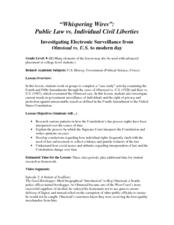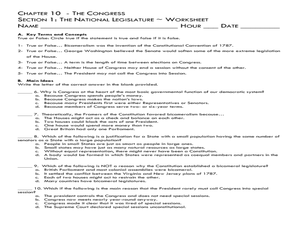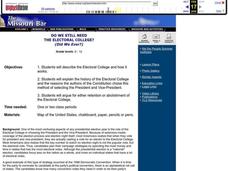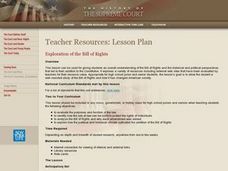Heritage Foundation
Congress's War Powers
Declaring war is not as easy as some may think. High schoolers learn about Congress's limits regarding war by reading important clauses in the US Constitution. Various independent and collaborative activities reinforce learning, making...
Curated OER
Supreme Court Decisions and Their Effect On Us
Consider five Supreme Court cases and how their outcomes have directly affected the American population. Government students research and compose a 1-2 page pager outlining the examples of our daily life that have specifically been...
Curated OER
From Tinker to Fraser: Freedom of Speech in Public Schools
The Tinker and Fraser cases were taken the Supreme Court on the basis of the 1st Amendment right to Freedom of Speech. Learners discuss each case, the First AMendment, complete handouts, and conduct a role play activity. Handouts are...
Curated OER
Children's Literature and the Bill of Rights
Students read a variety of well-known studenT books and discuss concepts presented in the books as they relate to the Bill of Rights. They discuss the books and compare them to the Bill of Rights Amendments.
Curated OER
What are the 13th,14th, and 15th Amendments?
The 13th, 14th, and 15th Amendments are outlined in this PowerPoint. Each amendment is noted on its own slide, with a summary of its purpose and important sections of the actual document. Tip: Have students choose an amendment and write...
Curated OER
"Whispering Wires": Public Law vs. Individual Civil Liberties
High school student love discussing controversial issues like those brought up in this fourth amendment case study. They examine the 1928 Olmstead vs. U.S. prohibition court case, applying the fourth amendment to determine whether or not...
Curated OER
The National Legislature: ch 10
Answering comprehension questions during or after reading an informational text can help focus the reader's attention. Here are 5 True/False and 5 multiple choice questions related to the Congress, bicameralism, and basic governmental...
Curated OER
Arrest
Students become active participants in the legal process as they take on the roles of witnesses, jurors, and defendants in a trial simulation. An understanding and appreciation of the legal system is fostered through the experience.
Curated OER
Rights of the Accused: To Be Confronted with the Witnesses Against Him
Students take on the role of Supreme Court Justices, after reading summary of a case and the arguments for and against a defendant's appeal. They make a decision, write majority and minority opinions, and report their decision.
Curated OER
Civil Liberties and War Powers: Korematsu v. United States
Eleventh graders compare and contrast Supreme Court decisions dealing with the application of civil rights during times of war, with emphasis on discrimination and detention. Working in groups, 11th graders review cases and analyze how...
Curated OER
Hiibel vs. Sixth Judicial District Court of Nevada
Did Hiibel's arrest and conviction for not telling a police officer his name violate his rights? Have your learners read a short description of the case and answer the comprehension questions that follow. Resource links and extension...
Curated OER
Supreme Court Case Study: District of Columbia Vs Heller
Examine the Supreme Court case, District of Columbia vs Heller, to build a better understanding of the Bill of Rights. Learners visit three different websites, read the provided informational text, and then answer a series of critical...
Curated OER
The National Government and the 50 States
Test your government students' knowledge of the National Government with this review worksheet. Posing five true/false questions and five multiple choice questions about elements of the National Government, this activity could serve as a...
National Endowment for the Humanities
Creating the Office of the Presidency
The United States needed an executive power, but it wanted to avoid a monarchy. Using James Madison's notes on the Constitutional Convention, young historians look at the juggling act the Founding Fathers did to create a role for the...
Curated OER
Do We Still Need the Electoral College?
One of the most confusing aspects of any presidential election year is the role of the Electoral College. Learners read a bit about how the Electoral College works and then they hold a mock election in their classroom. They'll redraw a...
National Endowment for the Humanities
Background on the Patriot Attitude toward the Monarch
Learners explain the Patriot attitude toward the British monarchy, which helps them embrace the Founders' reluctance to have a strong executive under the Articles of Confederation as well as their desire to build in checks of executive...
Curated OER
Exploration of the Bill of Rights
Research the Bill of Rights and the necessity for each of the protections that it provides. They choose one of the rights and, pretending to be a framer of the Constitution, give a speech as to why that should be included in the...
Curated OER
Does My Hair Disrupt Your Learning
Students research the laws and policies for school dress codes in their school and others in their state or area and explore what others say about these policies. After research is complete, students divide into two teams to develop...
Curated OER
The Senate
Reinforce your future politicians' growing knowledge about Congress and the Senate with this quiz, which could also be used as a review activity. Questions address the requirements of becoming a senator, as well as the details of Senate...
Curated OER
The Constitution: The Country's Rules
Students become aware of the Constitution and why it is important. In this early government lesson, students compare the Constitution to the class rules. They are both set in place so that we all stay safe and have fun. Students draw...
Curated OER
Declaration of Independence and the Constitution
Fifth graders read a rewritten version of the Declaration of Independence, create a set of pictures illustrating the Preamble of the Constitution and create a version of the Declaration of Independence in the form of a song, a poem,...
Curated OER
Our Compromise, Our Constitution
Sixth graders explore, analyze and study our constitutional government and become aware of the purpose of our government. They assess the basic rights that are protected by the United States Constitution through graphic organizers and...
Curated OER
US & Iroquois Constitution Parallels
Students engage in a lesson that is concerned with the concepts related to comparing the United States and Iroquois Indians while focusing upon the foundations of the ruling documents like the US Constitution. They conduct research using...
Curated OER
Comparing the 1945 Vietnam Declaration of Independence and Constitution of 1992 with the United States Declaration of Independence and Constitution
High schoolers compare and contrast the Vietnamese and American plans for government. In this government systems lesson plan, students analyze and compare excerpts of the 1945 Vietnam Declaration of Independence, the Vietnam Constitution...

























